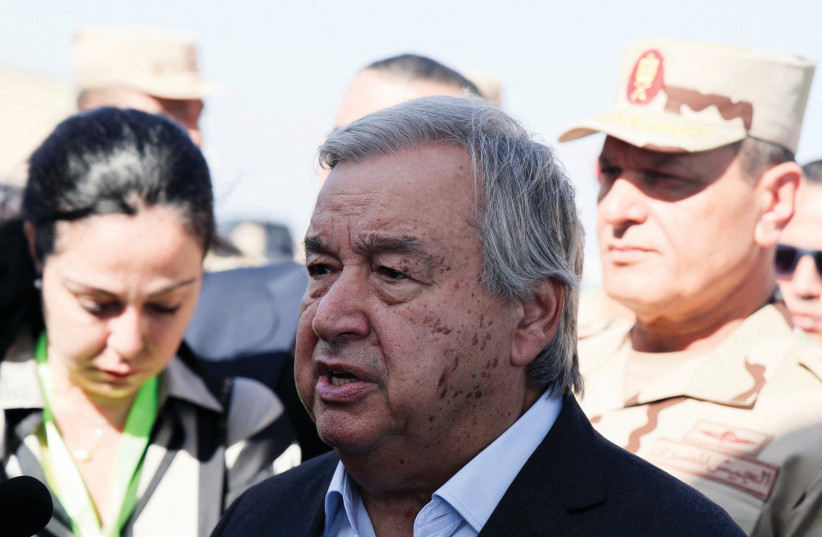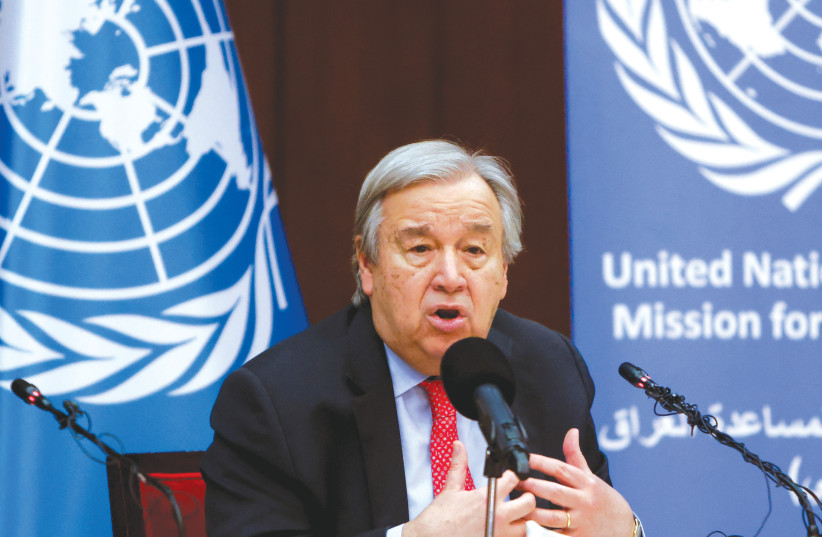CATHERINE PEREZ-SHAKDAM

Here, let’s focus on a somewhat overlooked factor: the role of the international community. This isn’t merely a story of local animosities; it’s a tableau of global failures.
While the Abraham Accords have marked a paradigm shift in Middle East relations, with Israel securing historic alliances in the Arab world, they also underscore an interesting divergence in diplomatic strategy. Israel and its Middle Eastern partners have made a calculated decision to decouple the issue of Palestinian statehood from the broader geopolitical landscape of regional normalization.
This strategic separation serves a dual purpose: it prevents the conflation of disparate geopolitical challenges and places the onus squarely on the Palestinians to engage directly with Israel, rather than deflecting responsibility and forever calling for peace without ever truly engaging in its mechanisms.
However, this approach has an unintended consequence: It provides an opportunity for the international community to abdicate its role as an objective arbitrator in the Israeli-Palestinian conflict. In severing the Palestinian question from broader regional politics, the international community finds itself with less immediate impetus to push for a resolution. This can be seen as a failing on a global scale – a dereliction of duty to serve as fair mediators committed to a sustainable resolution for both Israelis and Palestinians. 
 UN SECRETARY-GENERAL Antonio Guterres speaks at a news conference in Baghdad in March. Last month, the Security Council extended the mandate of the UN Assistance Mission for Iraq. (credit: AHMED SAAD/REUTERS)
UN SECRETARY-GENERAL Antonio Guterres speaks at a news conference in Baghdad in March. Last month, the Security Council extended the mandate of the UN Assistance Mission for Iraq. (credit: AHMED SAAD/REUTERS)

Narratives weaponize victimhood
Therefore, while Israel and its allies have been pragmatic in their approach to compartmentalize the Palestinian issue, the international community must be vigilant not to use this as an excuse to default on its responsibilities. The goal must remain steadfast: to work towards a fair and lasting solution that serves the interests of all parties involved.
The international diplomatic arena has also mistakenly lent credence to groups like Hamas, under the guise of representing Palestinian interests. In doing so, it gives a platform to an organization whose charter reeks of antisemitism – and in its name committed the worst of atrocities, thus complicating efforts to reach a genuine peace agreement and undermining universal principles of justice and human rights.Advertisement
The Islamic Republic of Iran’s role is particularly concerning. Rather than a mere bystander, Tehran serves as an enabler of conflict, supporting groups that further destabilize the region. Yet the international community has been less than vigilant in addressing Tehran’s role, sometimes even courting its leadership, thereby tacitly supporting a major instigator in this tragic drama.
The narrative spun by both Hamas and Fatah has weaponized victimhood to great effect. Far from being mere footnotes in international relations, such tactics signify an egregious moral and intellectual lapse – which theater has now moved to our Western capitals.
It’s an error not just of diplomacy but of ethical conduct, implicating not only regional but global actors.
For example, UN Secretary-General Antonio Guterres has made statements that have muddled, rather than clarified, the intricacies of the situation. When the individual leading a body as influential as the United Nations lacks precision in his comments, it reflects a broader failure in our collective moral and intellectual compass.
Humanitarian aid to Gaza presents also a moral and ethical paradox that defies easy resolution. The international community funnels millions of dollars annually into the territory in the hopes of alleviating the plight of its residents.
Humanitarian aid can be a double-edged sword
The troubling reality, however, is that this aid can become a double-edged sword. Hamas, which the US and the European Union designate as a terrorist organization, is deeply entangled in Gaza’s civic institutions, including its health ministry. The intermingling of governance and extremist ideology within the territory creates a quagmire that challenges our most deeply held ethical assumptions.
What ensues is a Kafkaesque conundrum for the global community. Aid sent to bolster healthcare services, provide clean water, or enhance education has been both diverted and misused to support an apparatus that promotes violence and instability. Funds and materials intended for construction have previously been redirected to build tunnels for militant activities, effectively turning international humanitarian aid into a resource for perpetuating conflict.
Given this intertwining of humanitarian efforts and less benevolent activities, the international community finds itself in a precarious situation. On one hand, the immediate human needs in Gaza are undeniable; they call for urgent action. On the other, there’s the sobering acknowledgment that, in delivering aid, external actors may inadvertently be fueling the very conditions they aim to alleviate.
Another layer of complexity is added when we consider the role of international actors who directly or indirectly support Hamas, under the premise of assisting the Palestinian cause. Funds and resources from such actors risk becoming complicit in a system that militates against peace and perpetuates cycles of violence.
The role of Qatar in the dynamics of the Israeli-Palestinian conflict adds an intricate layer of complexity to an already challenging landscape. As a significant provider of financial aid to Gaza, Qatar often frames its contributions as humanitarian in nature, aimed at alleviating the hardships faced by Palestinians. However, the country’s financial support has also been channeled to Hamas, which controls the Gaza Strip.
This association with Hamas places Qatar in a controversial position. On one hand, Qatar’s financial aid undoubtedly helps in maintaining some semblance of civil infrastructure in a highly unstable environment. On the other hand, by providing resources that end up in the hands of Hamas, Qatar risks perpetuating the very cycles of violence and instability it purports to ameliorate. In this sense, Qatar becomes an actor in a system that militates against peace and prolongs conflict.
Qatar presents a moral dilemma
The international community often finds itself at a crossroads when engaging with states like Qatar that maintain complex relationships with extremist groups. While Qatar’s financial contributions are welcomed for their short-term humanitarian relief, questions linger about the long-term implications of such aid.
Is it ethical to accept funding from a state that, whether intentionally or otherwise, supports an organization engaged in activities diametrically opposed to international peace and security?
The Qatari angle is emblematic of the wider moral and ethical dilemmas that face the international community in its approach to resolving the Israeli-Palestinian conflict. These complexities force us to grapple with uncomfortable questions about compromise, complicity, and the unintended consequences of international aid.
The role played by Qatar, and other similarly positioned actors, necessitates a thorough reexamination of the international strategies aimed at aiding Gaza. The complex ethical landscape dictates that we look beyond mere tactical adjustments, demanding instead an evolved understanding of the geopolitical nuances and ethical conundrums that shape the conflict. Only with such nuanced understanding can we hope to forge a path that leads to lasting peace and stability in the region.
Let’s be clear: The moral and intellectual challenges posed by this conflict are staggering, but they are not insurmountable. As the strategies of conflict evolve, so too must our frameworks for understanding and addressing them. Failing to do so is not just intellectually indolent; it is a betrayal of the core principles that should guide international engagement and policy.
The writer is director of Forward Strategy Ltd.
No comments:
Post a Comment